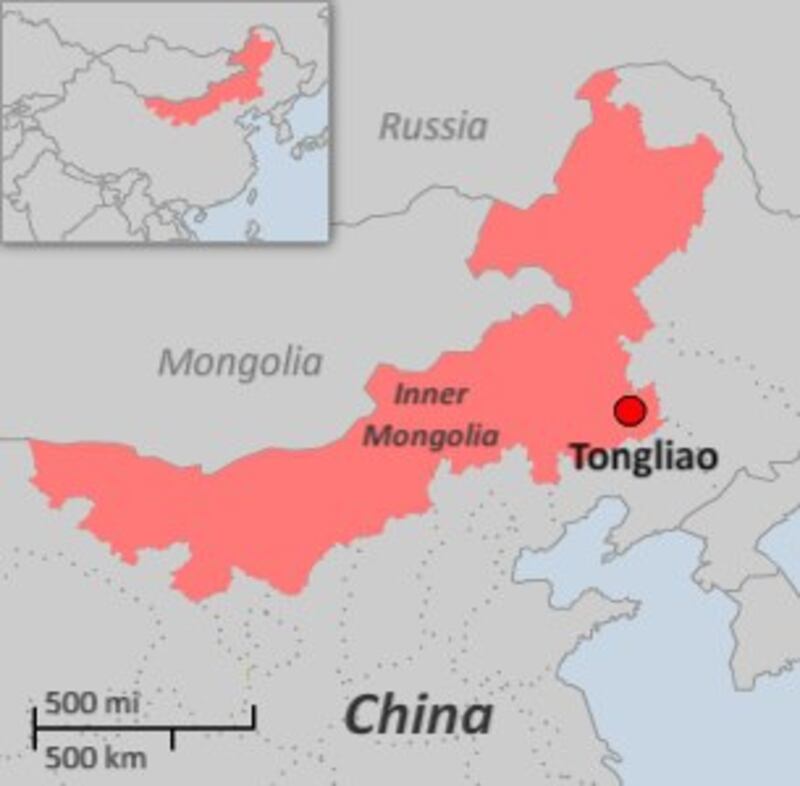An ethnic Mongolian dissident writer has been subjected to repeated harassment and beatings by authorities while in detention in northern China, according to new photos obtained by a Mongolian rights group.
The New York-based Southern Mongolia Human Rights Information Center (SMHRIC) said in a statement Thursday that it had received new information showing Govruud Huuchinhuu, a former activist in the 1981 Mongolian student movement, with severe bruising on her face and arms.
“SMHRIC obtained a written communication and new photos dated from July 20 to July 30, 2011, showing that Ms. Huuchinhuu Govruud … was frequently beaten by police from the Tongliao city Horchin district Public Security Bureau in eastern [Inner] Mongolia,” the statement said.
Huuchinhuu has been held in Tongliao city under “enforced disappearance” since Jan. 27, when she was released from the hospital following treatment for a stroke.
SMHRIC said Huuchinhuu, an activist and member of the banned Southern Mongolia Democratic Alliance (SMDA), is shown in a photo dated July 20 with a swollen contusion on her forehead, which was “likely caused by a blow from a baton.”
It said fresh bruises on her elbow and the area surrounding her eyes on photos dated July 22, 23, and 30 suggest “she had been beaten multiple times within an interval of 10 days.”
An officer who answered the phone at the Horchin district Public Security Bureau said he had no knowledge of Huuchinhuu being brought to the station.
“We have received no news of the missing person and she has never been detained at our facilities,” the officer said.
Members of Huuchinhuu’s family could not be reached by phone.

House arrest
Huuchinhuu was placed under house arrest on Nov. 11 last year after a brief detention by the Tongliao city Public Security Bureau for rallying Mongols online to gather and show their support for SMDA chief Hada on his expected release from prison.
Hada, who completed a 15-year jail term for “splittism” and “espionage” on Dec. 10 last year, is believed to have been released, but later taken into custody again with his wife and son.
During her house arrest, Huuchinhuu had extremely limited access to the outside world. Her Internet and phone lines were cut off by authorities and more than 20 police in two vehicles guarded her home 24 hours a day.
Huuchinhuu was admitted to the hospital under round-the-clock police guard in late December, but suffered from severe headaches for more than a month before being given medicine to temporarily relieve her pain.
She was believed to have been released from the hospital on Jan. 27 and immediately placed into police detention.
In a November interview, Huuchinhuu said she had not been presented with any legal documents during her arrest.
The U.S. Congressional Executive Commission on China said at the time that Huuchinhuu's house arrest “may have amounted to a form of home confinement that lacks basis in Chinese law.”
Mongolian activist
Huuchinhuu is an active member of the SMDA, an ethnic Mongolian organization that seeks the protection of Mongolian culture, language, and identity, and eventual independence from Chinese rule.
She has written two books dealing with the problems faced by China’s ethnic Mongolians, and hundreds of political essays.
Both of her books, The Stone-hearted Tree and Silent Stone, were recently banned by the Chinese authorities and withdrawn from bookstores.
Huuchinhuu is also a keen advocate of press freedom, helping to run a number of online Mongolian discussion forums, all of which have now been shut down for posting "separatist content" and “discussing ethnic problems."
In August 2007, she was deemed a “possible threat to the national interest and state security of China” after applying for a passport to travel to Mongolia. Her passport application was rejected and she was informed by the Tongliao Public Security Bureau that she could not travel abroad for five years.
Reported by Pan Jia Qing and D. Ling for RFA’s Cantonese service and by RFA’s Mandarin service. Translated by Laura Huang. Written in English by Joshua Lipes.
